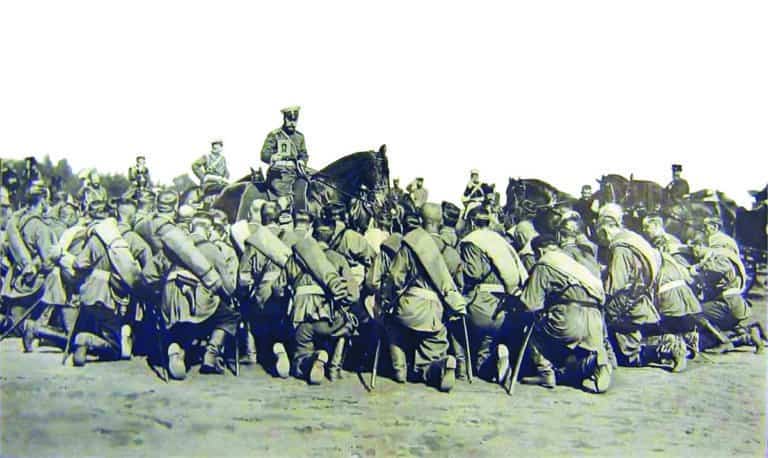He actually tried to stop it from happening
Editor's note: A Russian website recently published a long, fascinating article by renown historian Gleb Eliseev. It names 8 most widespread myths about Nicholas II and provides information that contradicts them. We decided to relay it to you in a series of weekly articles, in order to help people discover the truth about the long-slandered personal... and perhaps help explain why the Russian church made Nicholas II a saint. This is the third one in our series. For Myth 1, click here. For Myth 2, click here. These articles are not meant to be exhaustive, but they aim to lift slightly the curtain that obscures and distorts the true figure of the Last Russian Tsar.
The myth goes that Nicholas II consciously fabricated the Russo-Japanese War (1904-1905) in order to give Russians a “small victorious war,” ignite patriotic spirit and divert attention away from internal social unrest.
Russia's defeat (also attributed to Nicholas II personally) spoiled his little plan, proving again the fail of tsarism, his inflated ego and his lack of forethought.
Yet Nicholas II was actually fully aware of the risk involved and did everything in his power to stop the war from happening, unlike members of the Russian intelligencia, who confidently expected speedy victory and contemptuously called the Japanese “monkeys.”
Meanwhile, the Emperor knew perfectly well the difficulties a war in the Far East would entail, remembering predictions of specialists and saints (such as St. Seraphim of Sarov, who predicted that the first war under Nicholas II would be unsuccessful).

Therefore, Nicholas did everything to solve the tension in the Far East by diplomatic means. All Russian territory in the area had been acquired exclusively through diplomacy, not force. For example, before the Japanese attacked Port Arthur, Russians had signed an agreement to rent it out for 25 years.
The expression «We need in small victorious war» was found in the diaries of the Minister of Internal Affairs Pleve, who did indeed support war with Japan; Nicholas never said those words. It was during the Soviet Regime that they were assigned to the Last Tsar.

People also forget that the Japanese attacked first Port Arthur, with no declaration of war.
To reiterate: Russia did not start the war; it was obliged to react to Japanese aggression.
According to Orthodox England:
A belligerent, impatient and imperialistic Japan attacked Russia without warning at Port Arthur in 1905, just as it attacked the USA without warning at Pearl Harbour in 1941.
Russian unpreparedness came in part because it had spent so little on its armed forces – unlike the aggressive Western nations and their imitator - Japan.
It was Tsar Nicholas who had proposed international disarmament at the Hague. To accuse this peacemaker of starting the war to create national unity is simply a myth of those who know no history.
With only about a quarter of Western European and Japanese military spending, a peace-directed Russia was ill-equipped to fight a war thousands of miles from its capital.
Unarguably, the Russian generals (Kuropatkin, Rozhdestvensky, Stessel, Linevich) and admirals that led the war made multiple mistakes, but ( from Orthodox England)
To blame the Tsar for Japanese aggression or the disastrous inefficiency of individuals in his administration before and during that war is hardly just.

Another little-known fact regarding the war is the crucial role international funding had in the Russo-Japanese war.
Britain and America, worried about Russian expansion and influence in the Far East, provided the funds Japan needed for the war; without them, the Russo Japanese would not have been possible. Here are just a few of the facts:
- Most of the Japanese ships were constructed in British shipyard,
- Jacob Schiff, an American banker, provided 200 million dollars in bank credit, for which Japan awarded it him with a medal
- Japanese scholars admitted that at least half of their expenditure came from foreign loans
- Tokyo received 282 million dollars from international banks
Finally, many don’t realize what role revolutionaries played in inflaming social unrest during the war.
They openly desired Russian defeat. They were also directly funded by the Japanese government.
During the war, terrorism suddenly grew rampant; members of the tsar's family and other political persons were killed by terrorists.
Interestingly, a revolution began in Russia January 1905, many months before Russian defeat seemed possible, so it cannot be assigned to "demoralization."
It would be naive to think that the sudden flaming revolution was a natural grassroots movement.
The revolutionaries were suddenly incredibly well armed, organized and well-financed...by people who had a stake in the outcome of the war.
According to Petr. V. Multatuli, a well-known Russian historian and author of many books about the reign of the Last Tsar (as well as many other specialists), Japanese general Akashi Motojiro actively coordinated with Lenin. the Bolsheviks, and other revolutionaries, procuring arms and finances to help their cause.
Japanese involvement began in 1903, before the war began.
Japanese money made Bolshevik publications and activity possible. Just couple facts:
- Russian agents in St. Petersburg documented that "the Japanese government has given 14,500 rifles to different revolutionary groups
- Japanese helped buy the 315-ton steamer that brought more arms to Russia
- at least 1 million Japanese yen was spent to help revolutionary action in Russia
This 'unexplainable' flare of revolutionary activity caused such chaos that continuing the war was impossible and Russia was forced to admit defeat in the war with Japan.
Blaming a person, any person, for single-handedly starting and losing the Russo-Japanese War seems somewhat simplistic and ignorant, simply because blaming one person for such a complex situation as any war is ridiculous.
But it is especially absurd to blame Nicholas II for deliberate, insidiously planned aggression because the tsar hated violence and war.
He famously said:
"I do not want war. I have made my uncompromisable rule to undertake everything, to salvage for my people all the benefits of peaceful life."

